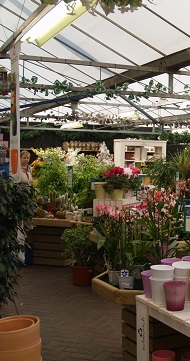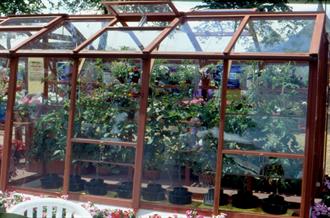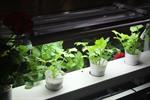Develop a foundation of skills and knowledge in hydroponic supplies
 Gain a foundation of skills and knowledge, enabling you to
confidently advise customers buying hydroponic supplies
Gain a foundation of skills and knowledge, enabling you to
confidently advise customers buying hydroponic supplies
- Be able to provide
support through developing guidelines for the successful culture of
plants.
- Course Duration: 100 hours of self-paced study. Start at any time and study where and when you want to.
A Course For:
- Hydroponic Shop Managers and Staff.
- Hydroponic Equipment and Materials Manufacturers and Suppliers.
- Others working with hydroponic growers who need a better
knowledge of hydroponics; such as irrigation suppliers, greenhouse
suppliers, environmental equipment suppliers.
This course does overlap significantly with Hydroponics I and with
Home Hydroponics, and you should avoid doing more than one of those
three. The difference is that Home hydroponics is a less intensive
academic load, and geared to the hobbyist; while hydroponics I is a
broad based course, while this course is written specifically for people
who are in a position of supplying services or products to hydroponic
growers, both amateur and trade.
COURSE STRUCTURE AND CONTENT
There are 10 lessons in this course:
1. Hydroponics – Nature and Scope
- What is hydroponics.
- Providing for support, water, air and nutrients.
- Advantages over other horticultural techniques.
- System components.
- Other equipment.
- System types - Wick, Water Culture, Ebb and Flow (or flood and drain system), Drip (with either a recovery or non-recovery process), NFT (Nutrient Film Technique), Aeroponics.
- A global industry.
- Resources.
2. Types of Hydroponic Systems
- System location.
- Containers or beds.
- Watering/nutrient application equipment.
- Trellising.
- Root media.
- Two simple systems.
- Types of systems - solution culture, aggregate culture.
- NFT - alternative layouts.
- Pond, raft, float, raceway systems.
- Aeroponics.
- Aggregate coir system.
- Rockwool culture.
- Gericke method.
- Bengal system.
- Sand culture.
- Bucket and gravity feed.
- Hanging baskets.
- Solution dispensation methods.
- Sub irrigation.
- Ebb and flow systems.
- Techniques -drip, slop, misting, wick, injector,etc.
- Soil-less organic mixes.
3. Introduction to Plant Nutrition and Understanding Nutrient Labels
- Plant growth factors.
- How plants grow.
- Plant structure -roots, stems, leaves, reproductive parts.
- Mechanisms for taking up nutrients.
- Plant nutrients for growth.
- Macronutrients.
- Micronutrients.
- Role of pH - acidity and alkalinity.
- Extreme pH effects on plants.
- Understanding nutrient formulae.
- Writing chemical names correctly.
- Nutrient solutions.
- Mixing nutrients.
- Nutrient deficiency symptoms.
- Summary of fertilisers used in hydroponic nutrient mixes.
4. Introduction to Growing Media
- NFT system choices.
- Capillary matting.
- Types of media.
- Water-holding capacity.
- Air holding capacity.
- Drainage (this is different to air holding capacity).
- Nutrient holding capacity.
- Vermiculite.
- Sand and gravel.
- Perlite.
- Pumice and scoria.
- Expanded plastics.
- Expanded clay.
- Rockwool.
- Sawdust.
- Peat moss.
- Coir.
- Composted bark.
5. Basic Hydroponic Systems and Components
- Choosing an appropriate sized system.
- Materials for NFT systems.
- NFT channel size and solution volume.
- NFT channel slope.
- NFT delivery and drainage.
- Size of tanks and nutrient reservoirs.
- Materials for substrate systems - concrete, metal, timber, plastic.
- Irrigation design.
- Pumps and pipes.
- Aggregate materials - sand, gravel.
- Materials to use with rockwool.
- Materials to use with sawdust.
- Aeroponics.
6. Nutrition Management
- Fertiliser salts for formulations.
- Nutrient formulations.
- Nutrient formulation stock solutions.
- Formulas for different systems.
- Growth versus bloom formulas.
- Making up stock solutions from nutrient salts.
- Adjusting solutions using electrical conductivity measurements.
- EC on hydroponics.
- pH adjustment.
7. Climate Management Equipment
 Greenhouses.
Greenhouses.- Growing plants in a greenhouse.
- Other growing structures.
- Environmental control equipment.
- Environmental factors that influence plant growth.
- Plant needs - optimum, tolerated, not tolerated.
- Temperature control methods.
- Understanding heat loss.
- Types of localised heaters.
- Centralised heating systems.
- Temperature control principles.
- Light factors.
- Short day length plants.
- Long day length plants.
- Day length neutral plants.
- Artificial light.
- Horticultural management in a greenhouse.
- Pollination.
- Ventillation.
- Carbon Dioxide enrichment.
- Greenhouse Cooling.
- Fans.
- Fog.
8. Common Pests and Diseases
- Hygiene.
- IPM.
- Common Pests in hydroponics.
- Common diseases in hydroponics.
- Bacterial diseases in hydroponics.
- Viruses in hydroponics.
- Nematodes in hydroponics.
9. Deficiencies, Toxicity and pH Control
- Nutrient mobility and deficiencies.
- Other modes of detection.
- Nutrient toxicities.
- Salinity controllers.
- Nutrients and pH.
- pH controllers.
10. Troubleshooting Systems
- EC (CF) and nutrient solution levels.
- EC and TDS meters.
- Maintaining nutrient levels.
- Nutrient solution management.
- Nutrient temperatures.
- Organic hydroponic nutrient solution problems.
- Water reticulating systems.
- Water in run to waste systems.
- Water treatments.
Learn and Earn with an Expert Knowledge of Hydroponics
 Hydroponics is a big industry, with even bigger potential, offering lots of employment and business opportunities.
Hydroponics is a big industry, with even bigger potential, offering lots of employment and business opportunities.
There are many things to learn about hydroponics if you are to do it well.
Nutrition management is one of the most complex aspects of hydroponic growing. Nutrients are the building blocks of plant growth. In order to grow plants using hydroponics, some understanding of how plants grow is necessary. Also, to properly make up nutrient solutions or advise others about their use, some understanding of what the different plant nutrients are and what they are used for is required.
Anybody can grow plants in soil with reasonable success, but to grow plants in hydroponics you must understand how the plant grows so that you can control the temperature, water, oxygen and nutrients in the root zone.
Mechanisms of Nutrient Uptake
Plant roots are where nutrient solutions are taken up into the plants. Prior to their absorption into root cells, nutrients reach the surface of roots by three mechanisms - mass flow, diffusion, and root interception.
- Mass flow - the most important of these mechanisms quantity wise is the movement of plant nutrients in flowing nutrient solution.
- Diffusion - is movement by normal dispersion of the nutrient from a higher concentration (such as near its dissolving mineral source) through nutrient solution to areas of lower concentration of that nutrient.
- Root interception - is the extension (growth) of plant roots into new areas where there are untapped supplies of nutrients in the nutrient solution.
All three processes are in constant operation during growth. The importance of each mechanism is in supplying nutrients to the root surface for absorption by the root varies with the chemical properties of each nutrient. Nevertheless, mass flow, because of the large amounts of water flowing to and absorbed by roots as water is transpired from the plant, is the dominant mechanism and supplies about 80% of most nutrients to root surfaces.
Plants also absorb nutrients through small openings in leaves, the stomata. Carbon enters almost entirely through the stomata as carbon dioxide, releasing the oxygen (02) produced during the photosynthesis in gaseous form. Hydrogen, as a part of water molecules, is absorbed through stomata, but this intake is usually small compared to the amount entering through the roots.
More than just the Nutrients though
Understanding nutrition is however just one aspect of what you need to learn. You also need to understand the pumps, irrigation equipment, growing substrates, testing methods and much much more.
Hydroponics is a complex subject; and in some respects, the complexity of the subject creates opportunities for people with appropriate specialised knowledge.
Anyone who has a solid, in depth, technical understanding of
hydroponics, will be better placed to work in the industry; whether in a
hydroponic shop, farm supply business or as an independant consultant
or specialist.
WHAT NEXT?
Register to Study - Go to “It’s Easy to Enrol” box at the top of the page and you can enrol now.
or
Get Advice – Email us at info@acsedu.co.uk OR
Use our FREE COUNSELLING SERVICE to contact a tutor
CLICK TO CONTACT US